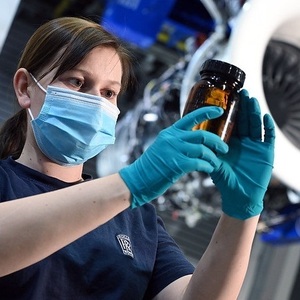Rolls-Royce tests 100% SAF in business jet engine

SOURCE: Rolls-Royce
February 3, 2021
BY Rolls-Royce
Rolls-Royce has conducted the first tests of 100 percent sustainable aviation fuel (SAF) in a business jet engine, as part of our ongoing ambition to play a leading role in enabling the sectors in which we operate reach net zero carbon by 2050. The tests on our latest business aviation engine in development, the Pearl 700, in Dahlewitz, Germany, come just weeks after unblended SAF was successfully used for the first time in engine ground tests on a Trent 1000 engine in Derby, U.K.
This test demonstrates once again that our current engines for large civil and business jet applications can operate with 100 percent SAF as a full “drop-in” option, laying the groundwork for moving this type of fuel towards certification. At present, SAF is only certified for blends of up to 50 percent with conventional jet fuel and can be used on all current Rolls-Royce engines.
Advertisement
The SAF that was used in the tests was produced by low-carbon fuel specialist World Energy in Paramount, California, sourced by Shell Aviation and delivered by SkyNRG. This unblended fuel has the potential to reduce net CO2 lifecycle emissions by more than 75 percent compared to conventional jet fuel, with the possibility of further reductions in future.
Dr Joerg Au, chief engineer – business aviation and engineering director Rolls-Royce Deutschland, said: “Sustainable aviation fuels have the potential to significantly reduce the carbon emissions of our engines and combining this potential with the extraordinary performance of our Pearl engine family brings us another important step closer to enabling our customers to achieve net zero carbon emissions.”
The highly efficient Pearl 700 combines the Advance2 engine core, the most efficient core available across the business aviation sector, with a brand-new low-pressure system, resulting in an 8 percent increase in take-off thrust at 18,250lb compared to the BR725 engine. The engine offers a 12 percent better thrust-to-weight ratio and 5 percent higher efficiency, while maintaining its class-leading low noise and emissions performance.
Advertisement
It brings together innovative technologies derived from the Rolls-Royce Advance2 technology demonstrator programs with our experience from the Rolls-Royce BR700, today’s leading engine family in business aviation. This includes a highly-efficient 51.8” blisked fan, a high pressure compressor with a market-leading pressure ratio of 24:1 and six blisked stages, an ultralow emissions combustor, a two-stage shroudless high pressure turbine and an enhanced four-stage low pressure turbine that is one of the most efficient and compact in the industry.
Related Stories
The U.S. EPA on May 14 delivered two RFS rulemakings to the White House OMB, beginning the interagency review process. One rule focuses on RFS RVOs and the other focuses on a partial waiver of the 2024 cellulosic RVO.
The U.S. EPA on May 15 released data showing nearly 1.79 billion RINs were generated under the RFS in April, down from 2.09 million generated during the same month of last year. Total RIN generation for the first four months of 2025 was 7.12 billion.
Calumet Inc. on May 9 announced sustainable aviation fuel (SAF) capacity at its Montana Renewables biorefinery is expected to reach 120 MMgy to 150 MMgy sooner than previously reported for a fraction of the originally expected cost.
Tidewater Renewables on May 8 announced that its 3,000-barrel-per-day renewable diesel plant in Prince George, British Columbia, operated at 75% capacity during the first quarter, up from 71% during the same period of last year.
Aemetis Inc. released Q1 results on May 8, reporting increased biogas production, progress with efficiency improvements at the Keyes ethanol plant, and resumed biodiesel deliveries. Financing activities are also underway for a proposed SAF project.
Upcoming Events










